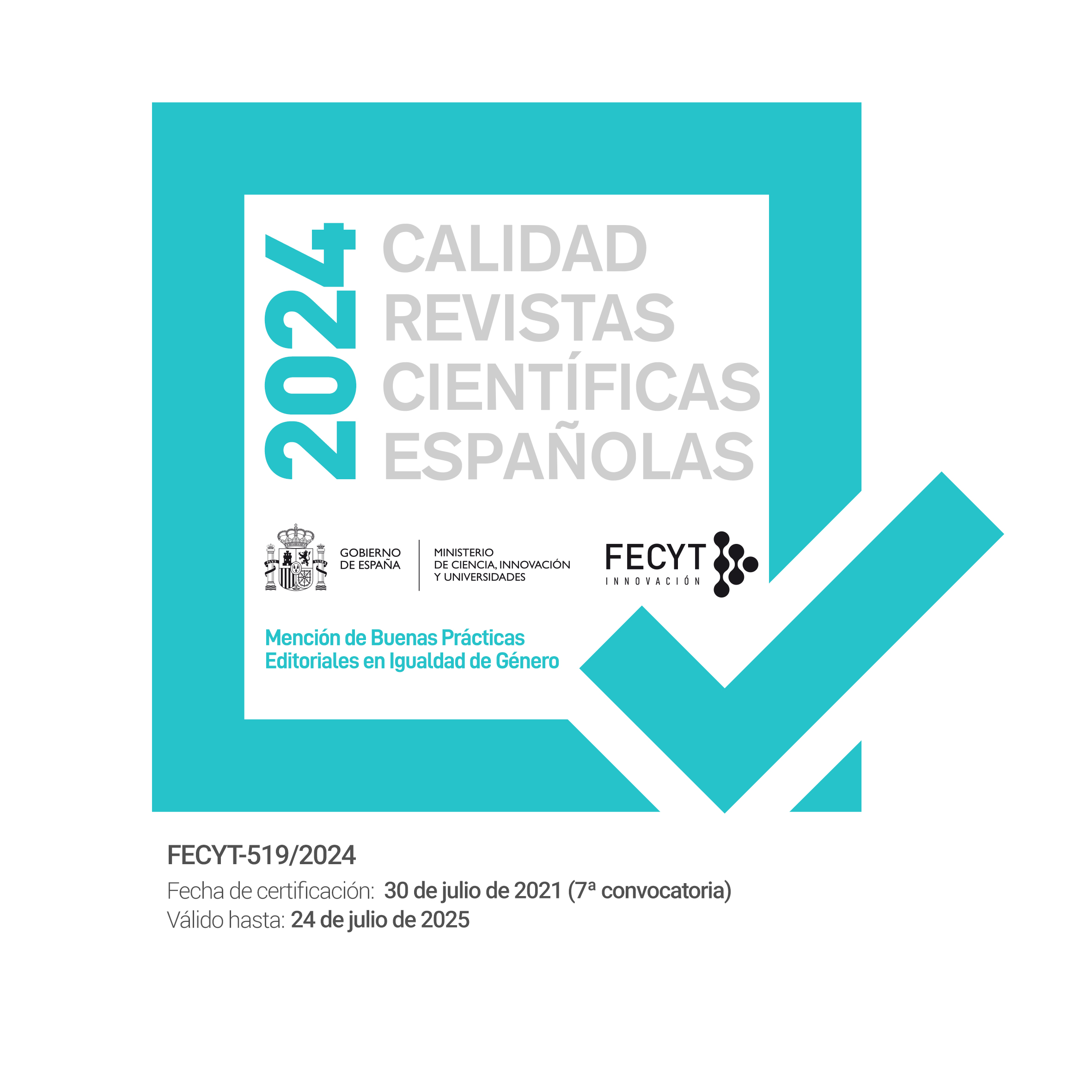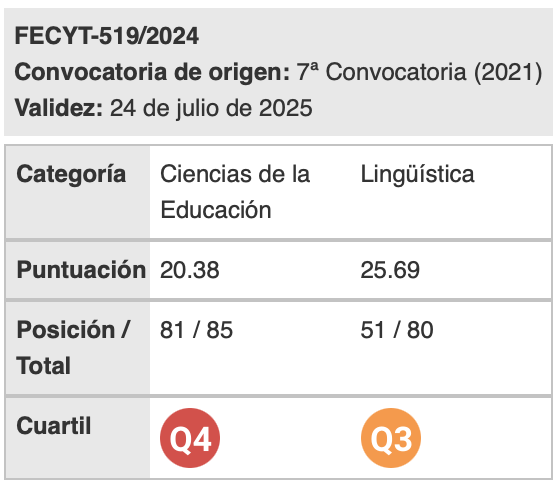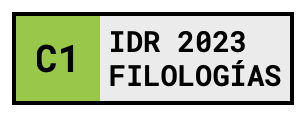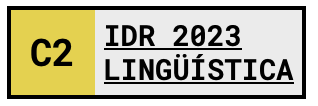Blaj-Ward, L. (2014) Researching Contexts, Practices and Pedagogies in English for Academic Purposes. Basingstoke: Palgrave Macmillan, pp. 204
Palabras clave:
English for Academic Purposes, language teachingResumen
Responding to a growing interest in evidence-based research within EAP, Researching Contexts, Practices and Pedagogies in English for Academic Purposes is as timely as it is wide-ranging, well-thought and suggestive. It becomes a much-welcome contribution to the literature, as it offers an impressively detailed snapshot of current trends and approaches within educational research as these have been directly applied to EAP. The book is not aimed at active educational researchers, but to “practitioners and decision-makers in the area of supporting international students in English-medium higher education” (p. 2). It reads, as a consequence, as much more than an aggrandized compilation of recent research; strongly driven by context, it offers valuable background knowledge and a wealth of research practices that readers are encouraged to apply to their own contexts...
DOI: 10.20420/rlfe.2015.0016
Descargas
Citas
Alexander, O. (2012). Exploring teacher beliefs in teaching EAP at low proficiency levels. Journal of English for Academic Purposes, 11(2), 99-111.
Basturkmen, H. (2007). Ideas and options in English for Specific Purposes. Mahwah, NJ: Lawrence Erlbaum Associates.
Belcher, D. D. (2006). English for Specific Purposes: teaching to perceived needs and imagined futures in worlds of work, study, and everyday life. TESOL Quarterly, 40, 133-156.
Bloch, J. (2013). Technology and ESP. In B. Paltridge, & S. Starfield (Eds.), The handbook of English for Specific Purposes (pp. 385-401). Oxford: Wiley-Blackwell.
Bruce, I. (2011). Theory and concepts of English for academic purposes. Basingstoke: Palgrave Macmillan.
Cheng, A. (2011). ESP classroom research: Basic considerations and future research questions. In D. Belcher, A. Johns, & B. Paltridge (Eds.), New directions in ESP research (pp. 44-72). Ann Arbor, MI: The University of Michigan Press.
Cousin, G. (2009). Researching learning in higher education: An introduction to contemporary methods and approaches. Abingdon: Routledge.
Doiz, A., Lasagabaster, D., & Sierra, J. (2012). English-medium instruction at universities: Global challenges. Bristol: Multilingual Matters.
Hamp-Lyons, L. (2011). English for Academic Purposes: 2011 and beyond. Journal of English for Academic Purposes, 10(1), 2-4.
Hardwood, N. (2013). English language teaching textbooks. Basingstoke: Palgrave Macmillan.
Hardwood, N., & Petric, B. (2011). English for academic purposes. In J. Simpson (Ed.), The Routledge handbook in applied linguistics (pp. 243-258). Abingdon: Routledge.
Holme, R., & Chalauisaeng, B. (2006). The learner as needs analyst: The use of participatory appraisal in the EAP reading classroom. English for Specific Purposes(25), 403–419.
Hyland, K. (2006). English for Academic Purposes: An advanced resource book. Abingdon: Routledge.
Jenkins, J. (2013). English as a lingua franca in the international university. Abingdon: Routledge.
Kukusha-Hulme, A. (2012). How should the higher education workforce adapt to advancements in technology for. Internet and Higher Education(15), 247–254.
Liu, J.-Y., Chang, Y.-J., Yanga, F.-Y., & Suna, Y.-C. (2011). Is what I need what I want? Reconceptualising college students’ needs in English courses for general and specific/academic purposes. Journal of English for Academic Purposes, 10(4), 271–280.
Lucas, U., & Tang, P. L. (2013). Developing a capacity to engage in critical reflection: students' ‘ways of knowing’ within an undergraduate business and accounting programme. Studies in Higher Education, 38(1), 104-123.
Robson, S., Leat, D., Wall, K., & Lofthouse, R. (2013). Feedback or feed forward? Supporting Master’s students through effective assessment to enhance future learning. In J. Ryan (Ed.), Cross cultural teaching and learning for home and international students: Internationalisation of pedagogy and curriculum in higher education (pp. 53-68). London: Routledge.
Sovic, S. (2013). Classroom Encounters: International Students' Perceptions of Tutors in the Creative Arts. In S. Sovic, & M. Blythman (Eds.), International students negotiating higher education (pp. 87-103). Abingdon: Routledge.
Tight, M. (2012). Researching higher education, 2nd ed. Maidenhead: Society for Research into Higher Education/ Open University Press.
Trowler, P. (2012). Doing insider research in universities. Seattle, WA: Amazon Kindle Edition.
Walsh, S. (2013). Classroom discourse and teacher development. Edinburgh: Edinburgh University Press.
Wingate, U., & Tribble, C. (2012). The best of both worlds? Towards an English for Academic Purposes/Academic Literacies writing pedagogy. Studies in Higher Education, 37(4), 481-495.
Descargas
Publicado
Cómo citar
Número
Sección
Licencia
Aquellos autores/as que tengan publicaciones con esta revista, aceptan los términos siguientes:
- Los autores/as conservarán sus derechos de autor y garantizarán a la revista el derecho de primera publicación de su obra, el cuál estará simultáneamente sujeto a la Licencia de reconocimiento de Creative Commons que permite a terceros compartir la obra siempre que se indique su autor y su primera publicación esta revista.
- Los autores/as podrán adoptar otros acuerdos de licencia no exclusiva de distribución de la versión de la obra publicada (p. ej.: depositarla en un archivo telemático institucional o publicarla en un volumen monográfico) siempre que se indique la publicación inicial en esta revista.
- Se permite y recomienda a los autores/as difundir su obra a través de Internet (p. ej.: en archivos telemáticos institucionales o en su página web) antes y durante el proceso de envío, lo cual puede producir intercambios interesantes y aumentar las citas de la obra publicada. (Véase El efecto del acceso abierto).

Revista de Lenguas para fines específicos is licensed under a Creative Commons Reconocimiento-NoComercial-SinObraDerivada 4.0 Internacional License.






















